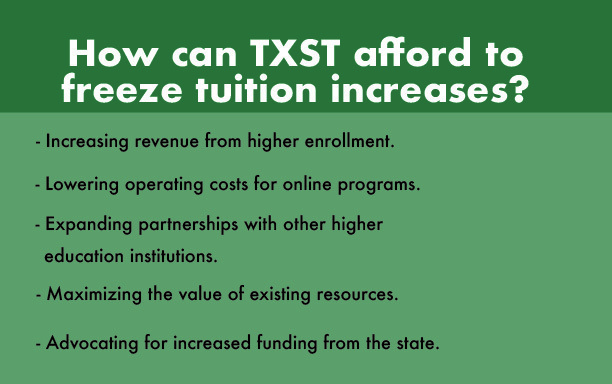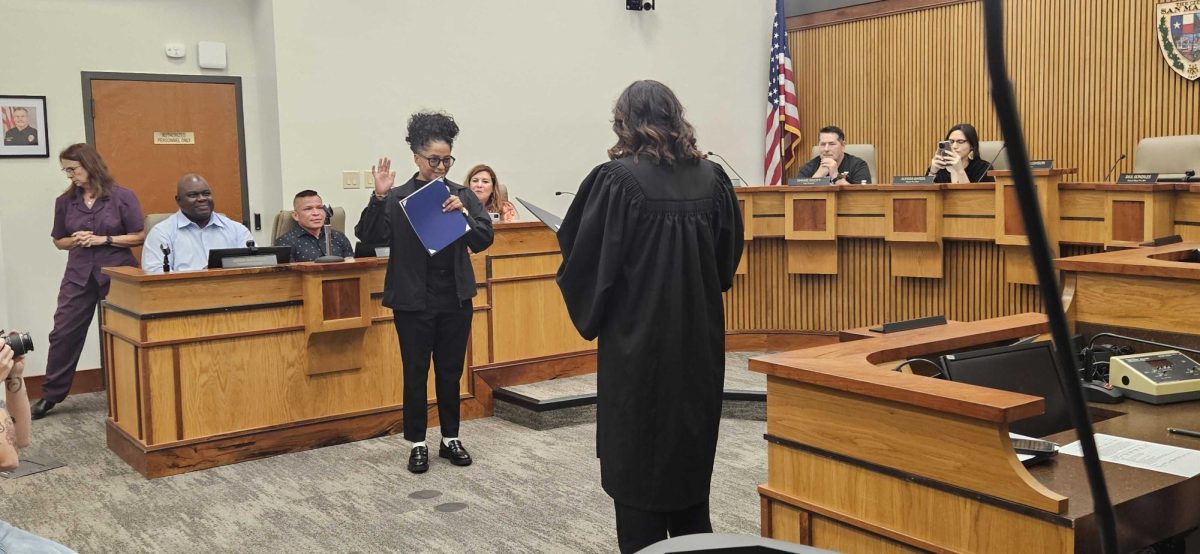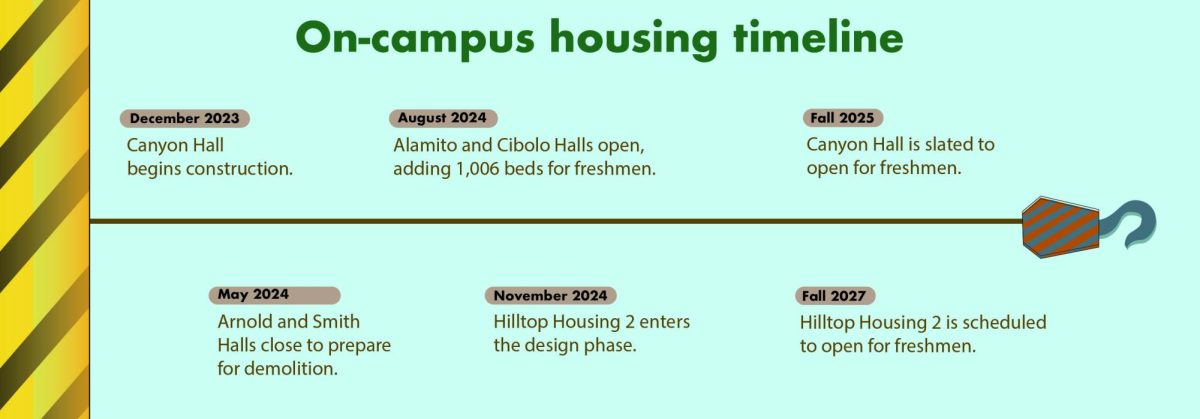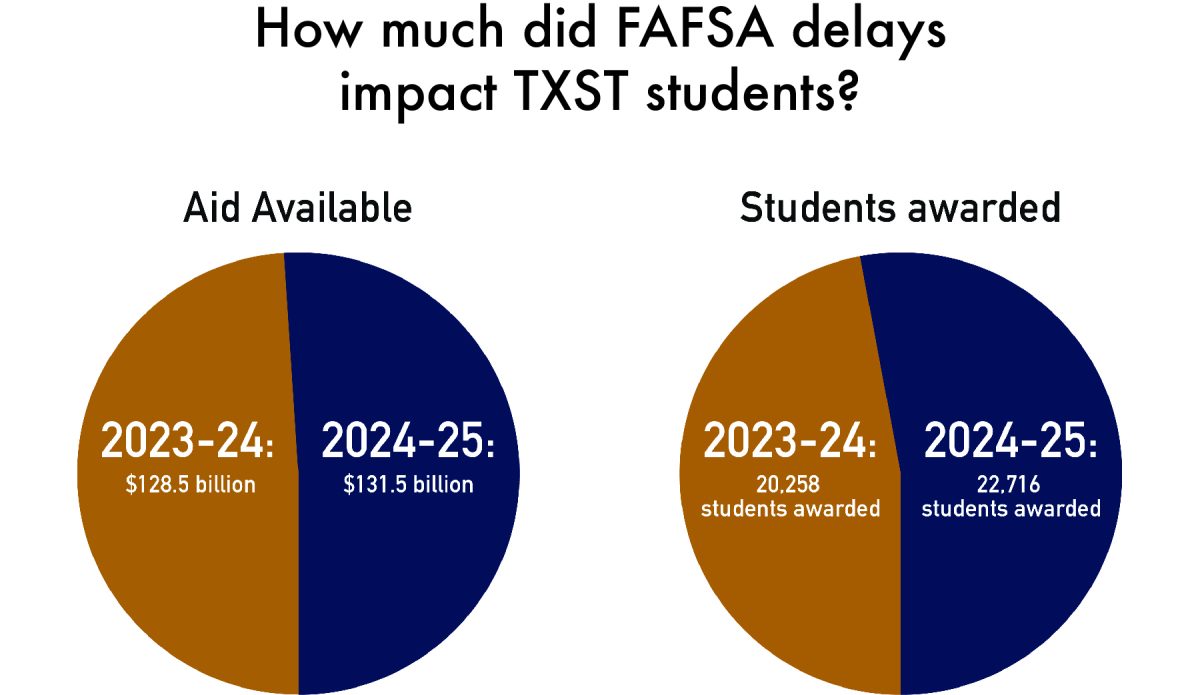Texas State will petition the Board of Regents to extend its “test-optional” stance to the high school class of 2022, allowing students to decide whether to submit their SAT/ACT scores as part of their admissions packet.
The COVID-19 pandemic severely limited the ability of College Board and ACT Inc. to distribute SAT and ACT exams to high school seniors looking to further their education. This intrusion potentially aided in motivating colleges and universities to reevaluate the hefty role admission tests play in determining who gets accepted into higher education.
In March 2020, Texas State adopted a test-optional stance for 2021 admissions, meaning if applicants graduate in the top 75% of their high school class, they can choose whether to submit their test scores to the university.
Gary Ray, Texas State’s associate vice president for Enrollment Management and Marketing, says applicants who opt out of submitting their scores will not be placed at a disadvantage against those who do; rather, all elements of their application will be reviewed holistically before a decision is made.
“We’re not going to wait for them to send in test scores; by not submitting it they’ve indicated they want to be test-optional,” Ray says. “For a studentwho does submit that test score then we certainly will use that in the process because they have elected to send it to us.”
Ray says the university will petition the Board of Regents this month to extend the test-optional stance to the 2022 admissions cycle.
Talent Search, a college preparation program, works with underrepresented groups to help ease and encourage students to explore what is available to them beyond high school. Because of the age inclusiveness of the program, Chelsea Moore, the grant director for Talent Search San Marcos, has been able to see students who joined as early as middle school graduate from the program and eventually go to college.
Moore believes this opportunity has allowed her to see what students are truly capable of in the classroom and that test scores are not always the best indicator of success.
“I don’t think it says anything about their actual ability to be a student, because I’ve seen so many students do so well, regardless of what scores they receive,” Moore says.
However, Moore says the usage of SAT and ACT scores in higher education go far beyond admissions.
“I think for those not actively working with students at the secondary school level, particularly high school, they’re not realizing how much this test plays a role in the student’s life,” Moore says.
Students’ scores are now used to determine financial aid and scholarship eligibility. For some students, exam scores dictate whether a remedial college class is needed before moving on to core subjects like math and English. Moore says high schools even use the scores in their academic performance reports sent to the Texas Education Agency to gauge the college readiness of the campus as a whole.
Marco Keller, a senior at San Marcos High School, says colleges going test-optional was somewhat of a relief for students who were worried about getting admitted into their top-choice universities.
“You don’t have that extreme pressure that you have to get these scores, because before I felt like you had to get like a certain score on the SAT test to be able to get into certain colleges because they’d just reject you based off of if you didn’t get a high enough score,” Keller says.
Keller says the change in the admissions process encouraged him to expand his horizons and apply to schools he would not have otherwise considered an option due to the competitive nature of their test score admission standards.
“I actually wasn’t sure which colleges I was going to be applying for, and as the colleges began going test-optional, I was like, ‘okay so if I don’t need an SAT, I can at least submit my application and see if like maybe I’ll get in’, like just shoot my shot, why not?” Keller says.
Though this is a step toward deemphasizing the role tests play in the admissions process, Moore says there is still work to be done.
“I think what I would prefer to happen is continue to make the SAT and ACTless of a major factor in multiple aspects of the college-going process,”Moore says.
At its Jan. 24 meeting, the Texas State Student Government Senate voted to indefinitely table a resolution that would call on the university to gradually phase out the use of SAT/ACT scores used for admission purposes over the next four years.
The two planned years of test-optional admissions will give the university time to determine whether the stance is viable for long-term usage.
“Going the two years of test-optional, it gives us the real luxury to really evaluate the system and make sure that we can deliver. It allows us time to think through how do the students do in our system that are test-optional without submitting test scores,” Ray says. “So, no decision has been made…but certainly nothing is off the table.”
Categories:
Texas State evaluates future of admissions tests
Tatiana Torres, News Contributor
February 8, 2021
In this file photo, incoming freshmen at the time, Liliana Hernandez (far right), Ilene Espinoza (middle right), Karen Novarro (middle left) and Citlaly Romero (far left) pose for a photo, Wednesday, June 19, 2019, outside of the Undergraduate Academic Center at Texas State. The four students were apart of New Student Orientation Group 23, led by counselors Lola Santos and Christina Gloria.
0
Donate to The University Star
Your donation will support the student journalists of Texas State University. Your contribution will allow us to purchase equipment and cover our annual website hosting costs.
More to Discover














